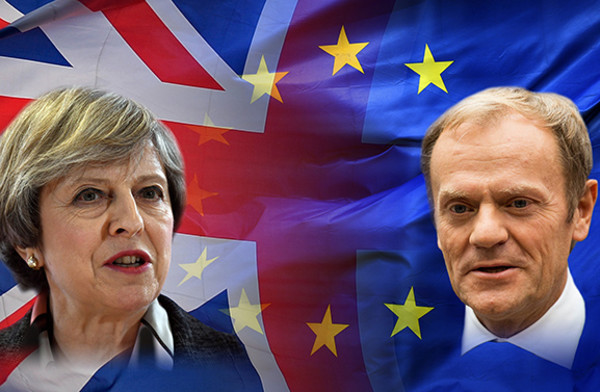
Article 3 / 4
Guide to Brexit one year onWhat advisers need to watch for during the negotiations

Formal discussions between the UK’s Brexit secretary David Davis and Michel Barnier, a French politician who is serving as European chief negotiator for Brexit, started as scheduled on 19 June.
There had been concerns the general election, which ended in a hung parliament, would delay further the official start of the Brexit negotiations.
But it still leaves the government with less than two years from now to have a new deal in place, potentially prolonging an already uncertain period for the country.
What should investors and advisers be watching for as the discussions progress?
Should they be making investment decisions based on what they think will happen at the end of the two years?
Opportunity knocks
Undoubtedly, there will be plenty of fund managers and stockpickers who will be watching the negotiations closely, and positioning their portfolios to benefit from any perceived opportunities in asset classes.
Glyn Owen, investment director at Momentum UK, says: “The UK market has performed well since the sharp falls immediately after last year’s referendum and we have been anticipating a period of consolidation and drift in equities in the shorter term.”
Momentum’s portfolios are already positioned for this possibility.
“Should there be unexpected shocks and weakness in markets in the UK, our current thinking is to use these as buying opportunities, but the moves so far are insufficient,” explains Mr Owen.
“Sterling is an undervalued currency but as with Brexit, the uncertainty created by the election is most likely to fall on the currency, so further weakness cannot be ruled out in the shorter term. Patience and calm seem the best approach in this environment.”
The winners and losers from the process had seemed relatively clear cut, as the falling pound appeared to initially boost FTSE 100 stocks which generate much of their revenue overseas, leaving mid-cap domestic companies at a disadvantage.
Stephanie Flanders, chief market strategist for Europe at JPMorgan Asset Management, notes: “I think we’ve taken the view there was so much uncertainty, both about the shape of the deal but also the impact on the domestic economy of high inflation and other more short-term Brexit effects that this wasn’t a time to make clear plays on small and mid-cap or large-cap, or that you had to make sure you were basically fairly neutrally positioned with regard to UK equities.
“But, of course, when you’re talking about the UK equity market, neutrally positioned usually means having a very large allocation to large cap. And we would certainly support that, given the level of the pound and given the early momentum for some of the key parts of the FTSE 100 has been pretty positive.”
She continues: “There’s no obvious strategy you should take at a big picture level but I think it’s actually the opposite, that you have to get very specific and quite active in the way you think about the UK market because of the way that a given set of arrangements will affect different companies in different ways, even if they’re in the same sector.”
The name's Bond, Brexit Bond
There may be some investors and savers who do want to take a view on the negotiations and how they are likely to end though.
The Family Building Society launched a Brexit Bond in June – a deliberate play on the process and its impact on currency.
The Brexit Bond is a fixed term savings bond, offering a fixed interest rate of 1 per cent per annum plus a potential 2 per cent bonus at the end of the fixed term when it matures on 2 May 2019.
There are two versions – the Brexit Optimist Bond and the Brexit Pessimist Bond –which will pay a bonus to investors depending on the change to the pound to euro exchange rate between 28 March 2017, the day before Article 50 was triggered, and 29 March 2019, the date when the UK is due to exit the EU.
Keith Barber, director of business development at The Family Building Society, explains: “Our innovative Brexit Bond gives savers a clear choice; one pays a bonus if the pound falls against the euro, the other if the pound rises.
“Of course, we live in an uncertain world and there are many other things that affect the pound/euro exchange rate, not just the Brexit negotiations. This means Brexit may not be the dominant factor determining the exchange rate on 29 March 2019.”
He adds: “Irrespective of how savers voted in the referendum in June 2016, they now have a further opportunity to express their views of Brexit and how it may benefit their savings.”
Those who are more generally invested in fixed income and credit markets should not be lulled into a false sense of security by the apparent lack of volatility at the moment.
Nick Hayes, manager of the Axa WF Global Strategic Bonds predicts volatility will pick up during the negotiating period.
He points out for fixed income investors, “this could be a great opportunity to pick up both government bonds and credit assets when yields and/or credit spreads rise”.
“For the moment, however, we remain cautiously positioned with high cash levels, a short duration bias and to a lesser extent cautious on credit and high yield. We don't think yields need to rise that much to make fixed income attractive again, but for the moment it's about being patient, cautious and preferring short dated low volatile bonds,” he suggests.
Russ Mould, investment director at AJ Bell, believes: “The best course of action is probably to do as little as possible, to avoid incurring unnecessary fees and dealing costs, and to use their time more productively by stress-testing portfolios.
"This will make sure they are sufficiently well balanced and able to cater for a range of possible economic outcomes – growth or slowdown, inflation or deflation or even stagflation – given the deceptively patchy nature of recent economic data on both sides of the Atlantic.”
Going for gold
One asset class which investors often flock to during times of heightened uncertainty is gold, which is uncorrelated to equities and bonds, thereby acting as a ‘safe haven’.
The Pure Gold Company reported a 76 per cent increase in demand for the asset between the general election on 8 June and 14 June, with 36 per cent coming from the same people who purchased gold in the wake of the referendum result last June.
Josh Saul, chief executive at The Pure Gold Company, acknowledges: “The gold price is still 15 per cent cheaper than its peak in 2012 and many would argue that the fundamentals that support gold are stronger today than they have been for many years.
“Many of our clients believe that a hung parliament and a divided nation will make it more difficult for the UK to negotiate effective trade deals with the rest of the world, which will impact the already fragile economy.
"They are motivated to purchase gold not merely to grow their portfolio but to protect and preserve their wealth against further unforeseen and unprecedented market forces.”
Adrian Lowcock, investment director at Architas, observes: “Gold is the main metal which investors use as a defensive asset class, the vast majority is either used for investment as a store of wealth or for jewellery.
“Gold still holds an allure for investors and is still seen as a good diversifier for investors, typically I would suggest investors have around 5 per cent in their portfolio.”
Those with an allocation to gold will be pleased to hear it has returned 15 per cent in the past 12 months in sterling terms, most of which is due to the fall in the pound following the Brexit vote, according to Mr Lowcock.
As is so often the case with investment, it all comes down to diversification, whether that’s across asset classes, regions or currencies.
David Carroll, head of strategy at Seven Investment Management suggests: “It isn’t just equity and asset class diversification that is important, but country risk too.
"Many investors would not dream of putting 80 per cent of their portfolios in an India fund, but we would argue that the same caution should also be applied to any single country.
“Many of our clients are worried about the impact of Brexit on the UK economy. Most of us have jobs in the UK, our homes are in the UK – we are all over exposed to the UK already. When it comes to investments, it’s important to diversify – and that includes away from developed markets, such as the UK."
eleanor.duncan@ft.com



